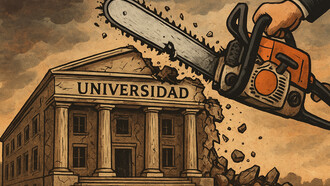In all this history for us Italians, if there is one positive thing, the top ten richest people in the world, there are not compatriots. The first Italian is in the fortieth place. It is a nice consolation, but it must be said that the Italian super-rich, as far as the pollution produced by their wealth is concerned, is not that they are better than the others. As Farhad Manjoo, opinion columnist, says, to solve pollution and excess CO2 emissions into the atmosphere we would have to get rid of them, obviously not physically, but to find a way so that their wealth does not exceed the limits of decency. The issue can be summed up in a question that everyone asks, and that is what can a person do with a billion US dollars to spend, for example, in a year? Can he buy a sumptuous villa by the sea? It has been done so before. Can he buy a villa in the mountains? He has already done it. Can he have a collection of a hundred vintage cars? He already has it. Can he buy a personal plane? He is already in possession of it. Can he keep ten lovers, one wife at a time, thanks to divorce, and a bevy of children? He is already doing so. If all this did not have an impact on the environment, one could pass over it, even if it is morally unacceptable.
We Europeans have often criticized American and NATO policy in Europe and other parts of the world (of course European governments, all of them, have never done it officially), but what is singular is that the most critical voices on world economic policy, therefore also on the American one, come almost all from the United States of America, little from Europe and not at all from Asia. In America, they have understood that the saying "the enemy is us" no longer holds up to the evidence of the facts. The real culprits of the economic and environmental crises are few, first of all, the richest men in the world, not all of us. According to the philosophy of "the enemy is us" the richest feel no responsibility for their behavior. They would justify their misdeeds.
Since April 22th, 1970, Earth Day has been celebrated every year, so for more than fifty years. Since that year, a season of protests has begun, for example over the reckless use of pesticides and herbicides in agricultural crops, the excessive use of plastic in every activity of our daily lives, carcinogenic industrial smoke, and the excessive emission of CO2 in the atmosphere, on oil, spilled into the seas accidentally or voluntarily, on overfishing the oceans, on the illegal disposal of toxic waste that is often not known where it goes, on the reckless consumption of soil to build and speculate and much more, but what were the results of these protests? Practically none. We continue to use all the contaminants of before that end up on our tables, and what is more serious is that the emission of CO2 into the atmosphere has increased dramatically, not to mention the other greenhouse gases.
After the end of the Second World War, it was believed that chimneys represented progress within everyone's reach, but then the facts denied this vision. Now European industries are relocating to the poorest countries. They are not doing this for an ecological issue and for the protection of our environment, that is, the European environment, but to avoid the excessive cost of labor and plant maintenance.
In the 70s, we believed we could touch the sky with a finger. Economic well-being, diffusion at all levels of the population of household appliances, color television, and the possibility of having a car per person. What was the result? It was a dizzying increase in pollution, the impossibility of circulating in the city with a small car, an incredible increase in car insurance, life, home, etc., an increase in the price of petrol and diesel, all unjustified, without any seriously addressing for adequate development of public transport: trains, planes, subways, etc., to reduce the excessive use of private cars.
In Japan during the 70s, the railways were already all electrified and the trains ran to more than 300 km/h. Well, then in those years I told myself that perhaps in Italy, after twenty years our trains could reach these speeds and safely. But more than 50 years have passed since then and Italian trains are still inadequate. Despite this, the Italian State has always financed the Railways without hesitation, of whatever political color the governments were, left, center-left and right, but the results have never been up to an advanced European State. The strange thing is that the Italian State, every year, spends many times more on the railways than on the maintenance of the Italian airlines, which were, and still are, much less in debt and with less staff than the railways. So why have the Italian media always targeted the continuing financial crises, for example, of Alitalia, a flag carrier that had to be guarded anyway, and not the railways? I leave the answer to those who understand these things better than me, although I suspect that a real answer will never come.
Ecology
Before the 70s the word "Ecology" did not exist in the Italian language vocabulary, or rather it was not in common use among the people. To tell the truth, in those years ecology was studied in universities, even if it was very projected on the side of the biological regulation of the various organisms in their natural environment of those times, not of our times, extremely more contaminated and less hospitable and with an infinity of species that are disappearing inexorably. The problem is that we continue to measure a country's economic development based on Gross Domestic Product (GDP), without reflecting that this economic index can be dangerous. Economists, even if not all of them, want us to believe that increasing GDP is the panacea, but it does not represent any well-being, no growth, if not a double-edged sword for the benefit of a few and on which we should reflect more.
Over time, after the 70s, the ecological movements faded, also because they felt exhausted and unheard by governments that apparently agreed with their principles, but that in reality rowed against them, with funding (never returned to the State) to polluting and unproductive industries and then in the end transferred abroad (see FIAT, for “good” example). In Italy, but not only, but we also have an infinity of examples of industries relocated somewhere else. The administrators who were at the head of this strategy, instead of being put on the index, were, and are still being, rewarded with high-level public recognition, with a knighthood, orders of merit, etc.
The carbon footprint
What is the carbon footprint as the Americans say or greenhouse gas emission produced by human activity? In reality, the carbon footprint is a topic that has been discussed for some time, but on which very interesting reflections are now being made precisely about the billionaires, the scroungers, scattered a little all over the world, but many of whom reside in the United States of America. This is a subject that opens a new light on this world problem on which few scientists, journalists, and politicians, unfortunately, dwell very little. Who knows why? More simply, the carbon footprint estimates the greenhouse gas emissions by each individual, or by a group of people, expressed in tons of CO2 produced every year and emitted into the atmosphere. This is a very simple calculation that even a child could do. The Carbon footprint is established by calculating the kilometers that we travel every year with our cars, trains, planes, and buses, that is, consumption. A calculation that we must however integrate with the energy necessary to warm up, cool down, eat, and more. The final calculation will tell us how many kgs of total CO2 we produce each year individually. Italy, for example, in 2017 produced a total of 355,454 tons of CO2 (out of sixty million inhabitants), a remarkable figure. The point now is that we should see who has produced more CO2, who has produced less, and who has produced almost nothing.
Conclusion
What conclusions can we draw from all this? To answer this, we must start from a principle that the history of humanity has always confirmed, namely that the wealth of a few creates social imbalances, corruption, silences to the media, and allows a few people to do what they want in spite of the rest of humanity. All the governments of the world should discourage these disproportionate enrichments in favor of the few and at the expense of the poorest. They should discourage them with serious and democratic economic policies. Unfortunately, those who talk so much about “economic democracy”, politicians above all, are the ones who turn a blind eye most of all to this injustice. The richest men in the world (see Forbes list) represent about 1% of the world's population but are responsible for the emission of CO2 into the atmosphere at least 100 times higher than that emitted by the world's poor population which makes up about 10% of the total. Despite this, the fortunes of billionaires, for example during this COVID 19 pandemic, instead of decreasing, have increased by a trillion US dollars, a far-fetched figure.
There is an allegory about the average consumption of chickens in the human population. We eat on average two chickens: this would mean one chicken per person, but the fact is that there are those who eat two and those who eat none, so the average always remains the same that is one chicken per head. This applied to the consumption of chickens, but it could be applied also to the emission of CO2 into the atmosphere. There are those who pollute a lot, certainly the richest people of the world, and those who do not pollute at all, but the billionaires would like us to believe that the responsibility lies with everyone. That is not the case.
Notes
Ilona Otto, Kim Mi Kyoung, Nika Dubrovsky & Wolfgang Lucht. Shift the focus from the super-poor to the super-rich. Nature Climate Change, 9(2), 2019.
Dario Kenner. Carbon inequality: The role of the richest in climate change. London, Routledge, 2019.
Farhad Manjoo. Abolish billionaires. The New York Times, New York, 6th February 2019.
Stella Levantesi & Giulio Corsi. Climate 'realism' is the new climate denial. New York, The New Republic, 16th August, 2020.
Beatriz Barros & Richard Wilk. The outsized carbon footprints of the super-rich. Science, Practice and Policy, 2021.
Angelo Tartabini. Pensiero animale. Rome, Orme Editore, 2021















